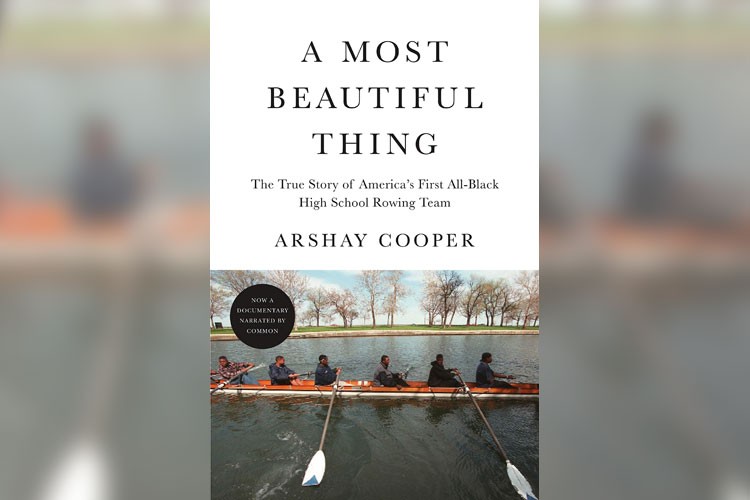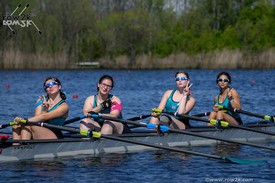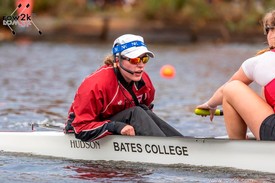Book Review: Arshay Cooper's 'A Most Beautiful Thing'

As noted in Arshay Cooper's recent interview with row2k, his memoir "A Most Beautiful Thing" seems to be made for the present moment. As the COVID-19 crisis continues, disproportionately affecting the Black and minority communities, and the violent deaths of George Floyd and others at the hands of police has occasioned a reckoning with the history of racism in the US, as well as a raft of discussions surrounding diversity, inclusion and a better way forward in all aspects of American life, including in rowing. Cooper's book seems both uncannily prescient and unbelievably precise in naming the issues and the facts of the daily struggle of Blacks and minorities to have anything approaching a normal life experience in this country.
Cooper's book, subtitled "The True Story of America's First All-Black High School Rowing Team," details the two years surrounding his experience with the creation of a rowing team at Manley High School, a virtually all-Black public school on Chicago's West Side. This is not a pure rowing book however; the lives of Cooper and his classmates as they deal with the pressures of broken families, drugs, gangs, poverty (and indeed, the simple facts and travails of adolescence), don't allow for that luxury.
Setting the stage is Cooper's own personal story; at the outset of the book, Cooper's family life is as difficult as they come (although, his situation is sadly common for a large percentage of his classmates). Cooper and his three siblings live together in a tiny apartment, their father absent, and their mother hooked on drugs; through perseverance and determination, the family makes it work.
The transformation of Cooper's mother Linda, as she undergoes rehab and reemerges as the family's rock, is arguably the foundation upon which the whole tale rests. Linda conquering drugs gives her family much needed stability, and her personal strength in overcoming her addiction serves as Cooper's acknowledged inspiration for his own determination to improve his life.
Enter rowing: starting a team at Manley is the brainchild of former Penn rower Ken Alpart, who, through sizeable personal investment of time (and money) provides the impetus for the formation of the team. Along with two other Manley teachers, known only by their first names, Coach Jessica and Coach Victor, Alpart sets up a rowing shell and a video of rowing in the school auditorium, which doubles as the cafeteria, in order to get students interested. It's not until they add free pizza to the offering, however, that they get any number of students to show up.
Cooper describes the scene:
I lean over and ask, 'Where do we sign up?'
From this moment on, Manley High has a rowing team. And while much of the team's subsequent experiences will be familiar to anyone who has started rowing, or has started a new rowing team (first strokes, acquaintance with the erg, practice experiences and disasters, etc.), Cooper gives us the full picture: all of these new experiences are tempered by, and in some instances, in direct conflict with, the daily experiences of these kids, and yet, the coaches and athletes begin to make it work in spite of all of their obstacles.

Cooper does a fine job of balancing the highs and lows, the comedy and the (actual) tragedies of the team's growth and development in the book, and in doing so, he manages the fine achievement of reminding his readers of all of those things that make the experience of rowing on a team so valuable: the shared struggle, the discipline it takes to be on a rowing team, and the lessons imparted by the sport itself, all of which can have such a momentous impact on the lives of those who participate. The nascent Manley crew is no exception.
This is not say that the story of Manley's rowing team is a fairy tale, although in the team's second year, when recent Northwestern grad Marc Mandel comes aboard to coach the boys, and Cooper and the team record impressive results on the erg and in racing, it comes darn close. All along, Cooper knows to place rowing in the greater context of the lives of those involved with the team, and doesn't sugarcoat a thing. Simply being on a rowing team is sadly not enough to change the lives of all of the participants, as Cooper makes amply clear.
One of the great strengths of the book is Cooper's voice; we get the prose of the grown-up Cooper, almost perfectly channeling the actions, thoughts and emotions of Cooper the teenager, juvenalia and all. Cooper is excellent in capturing the yearning of his younger self for something greater, and the process of living the effort and striving of getting there.
Beyond the strength of his voice, Cooper does a fine job of characterizing the protagonists; whether it's his coaches, his teammates, such as Malcolm Hawkins, Ray 'Pookie' Hawkins, Preston Grandberry, Alvin Ross, his mother, Linda Cooper, and others. One could argue that book reads strongly teenage-male-dominated, but that is a factor of the age and gender of its central voice more than anything else.
It's also to Cooper's credit that he does not leave, or attempt to leave this memoir with anything resembling a pat or firm conclusion, and in some ways, the Epilogue of the book is the most sobering portion to read; there remains a lot of work to be done, in Chicago and elsewhere.
Adding to the power of the book, of course, is the documentary film of the same name , directed by Olympic rower Mary Mazzio (whose first film was the powerful 'A Hero for Daisy'). With the release of the film repeatedly stymied by the ongoing pandemic, once it's in wide release it should only add to the heft of Cooper's story. (It's important to point out that, despite the commonality of the title, the film and the book complement each other extremely well; the film covers many events that occur outside of the scope of the book, or after the events described in the book, as well as deepening points made in the book, so that rather than the film serving as solely as a retelling of the book, it serves as a strong and useful addition.)
Arshay Cooper's "A Most Beautiful Thing" is such an important addition to the canon of rowing books that it is hard to overstate; it is so tempting to believe that, early in the 21st century, our sport has arrived at a place of development and professionalization that questions of biomechanics and training periodization are the most burning issues that rowing people need to confront. Continuing to build access to the sport and opportunities for people like Arshay Cooper, his teammates, and neighborhoods like his Chicago block is critical, and through his eloquent, occasionally heartbreaking, and deeply felt work Cooper reminds all of us of the potential in rowing to transform lives, and of the responsibility of those who can or would help to make sure that this potential is available to everyone.

If you enjoy and rely on row2k, we need your help to be able to keep doing all this. Though row2k sometimes looks like a big, outside-funded operation, it mainly runs on enthusiasm and grit. Help us keep it coming, thank you! Learn more.
Comments | Log in to comment |
There are no Comments yet
| |
- Bont Rowing
- Calm Waters Rowing
- Concept 2
- Craftsbury Sculling
- The Crew Classic
- CrewLAB
- Croker
- Dad Vail Regatta
- Durham Boat Co.
- Empacher
- Faster Masters
- Filippi
- Fluidesign
- h2row.net
- HUDSON
- Live2Row Studios
- Nielsen-Kellerman
- Oak Ridge RA
- Peinert Boat Works
- Pocock Racing Shells
- Race1 USA
- Rockland Rowing Masters Regatta
- RowKraft
- Rubini Jewelers
- Vespoli USA
- WinTech Racing
- Bont Rowing
- Calm Waters Rowing
- Concept 2
- Craftsbury Sculling
- The Crew Classic
- CrewLAB
- Croker
- Dad Vail Regatta
- Durham Boat Co.
- Empacher
- Faster Masters
- Filippi
- Fluidesign
- h2row.net
- HUDSON
- Live2Row Studios
- Nielsen-Kellerman
- Oak Ridge RA
- Peinert Boat Works
- Pocock Racing Shells
- Race1 USA
- Rockland Rowing Masters Regatta
- RowKraft
- Rubini Jewelers
- Vespoli USA
- WinTech Racing

















